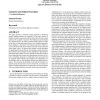Free Online Productivity Tools
i2Speak
i2Symbol
i2OCR
iTex2Img
iWeb2Print
iWeb2Shot
i2Type
iPdf2Split
iPdf2Merge
i2Bopomofo
i2Arabic
i2Style
i2Image
i2PDF
iLatex2Rtf
Sci2ools
124
click to vote
ATAL
2006
Springer
2006
Springer
Predicting people's bidding behavior in negotiation
This paper presents a statistical learning approach to predicting people's bidding behavior in negotiation. Our study consists of multiple 2-player negotiation scenarios where bids of multi-valued goods can be accepted or rejected. The bidding task is formalized as a selection process in which a proposer player chooses a single bid to offer to a responder player from a set of candidate proposals. Each candidate is associated with features that affect whether or not it is the chosen bid. These features represent social factors that affect people's play. We present and compare several algorithms for predicting the chosen bid and for learning a model from data. Data collection and evaluation of these algorithms is performed on both human and synthetic data sets. Results on both data sets show that an algorithm that reasons about dependencies between the features of candidate proposals is significantly more successful than an algorithm which assumes that candidates are independe...
| Added | 20 Aug 2010 |
| Updated | 20 Aug 2010 |
| Type | Conference |
| Year | 2006 |
| Where | ATAL |
| Authors | Ya'akov Gal, Avi Pfeffer |
Comments (0)

